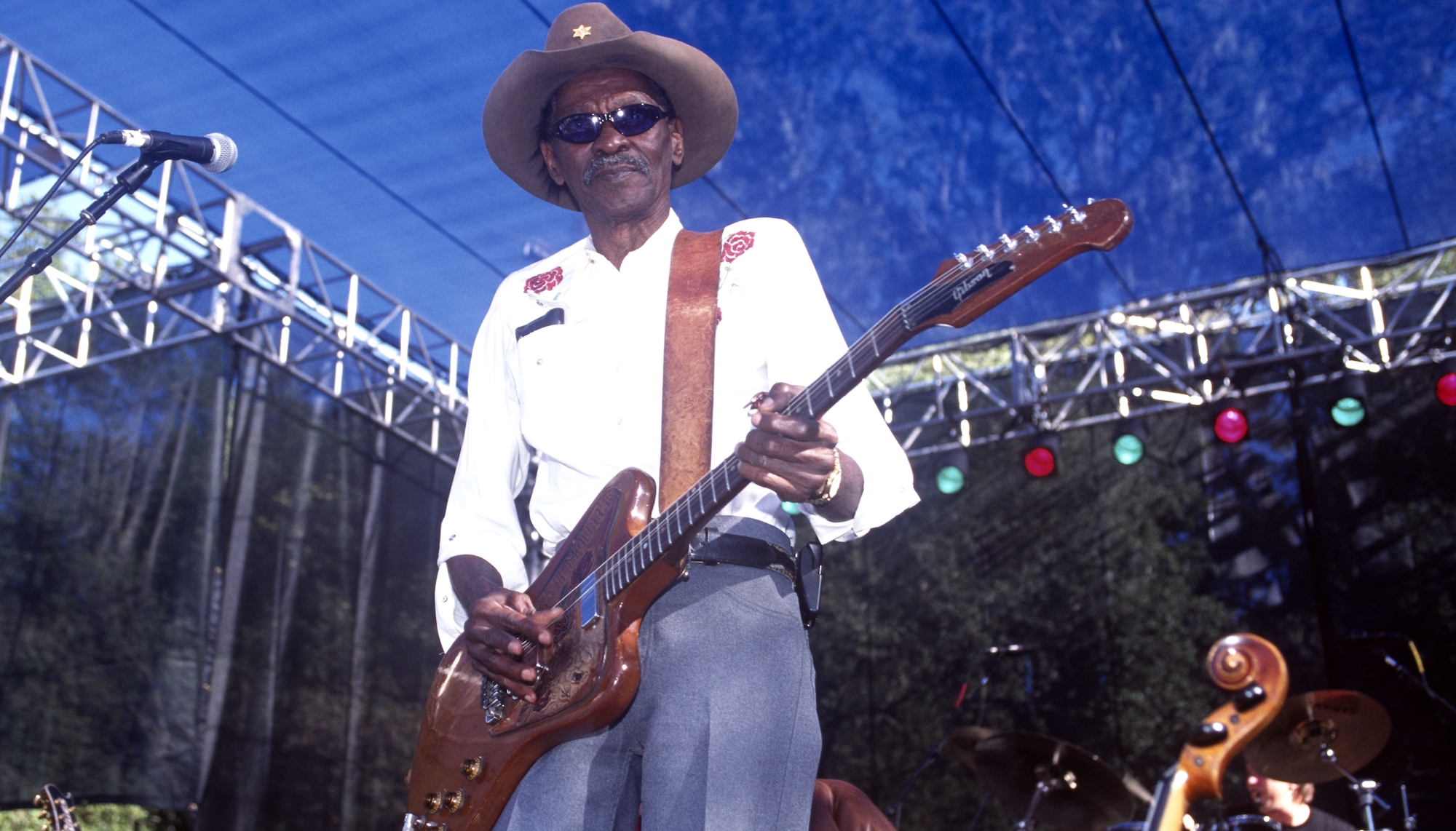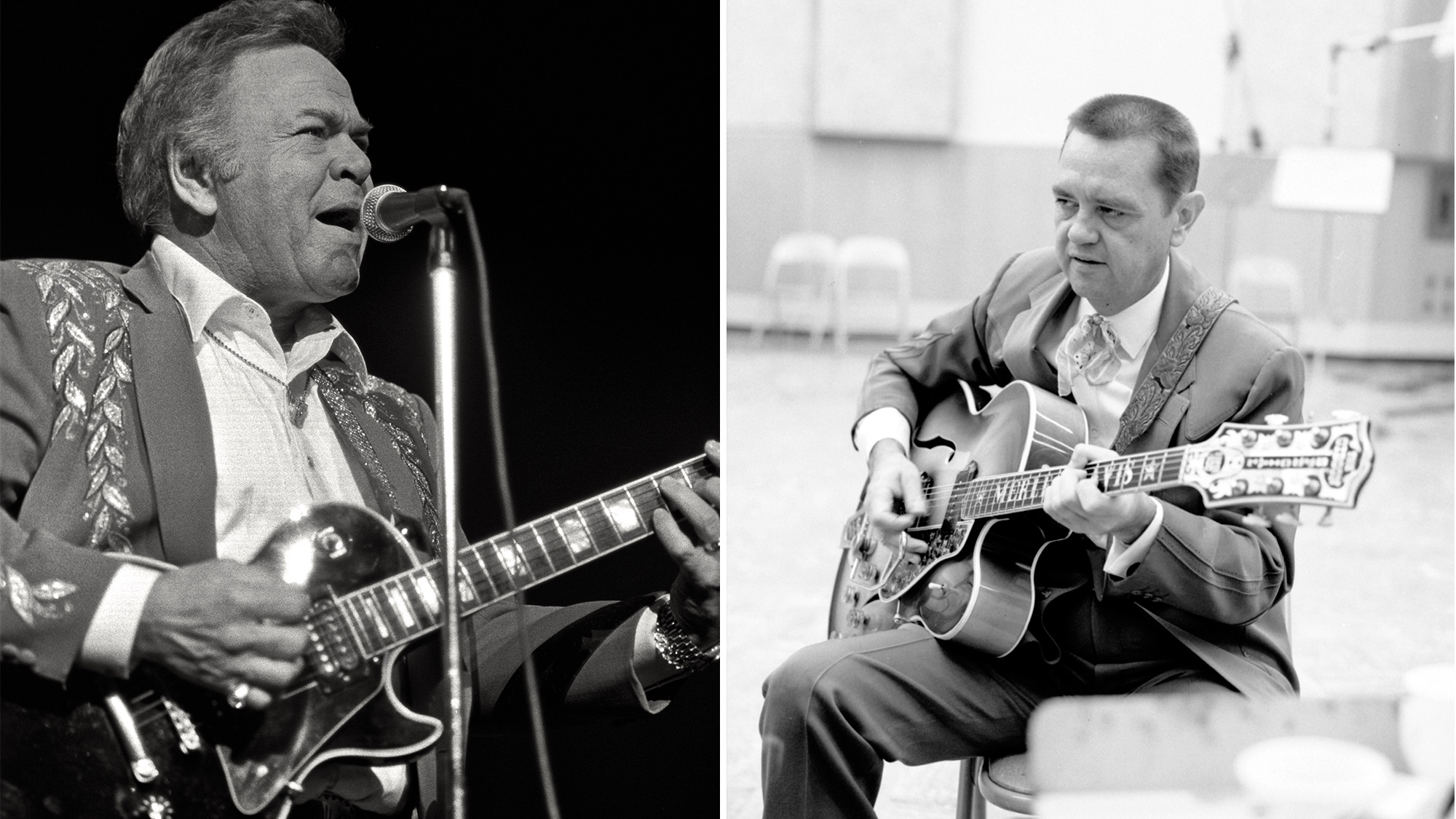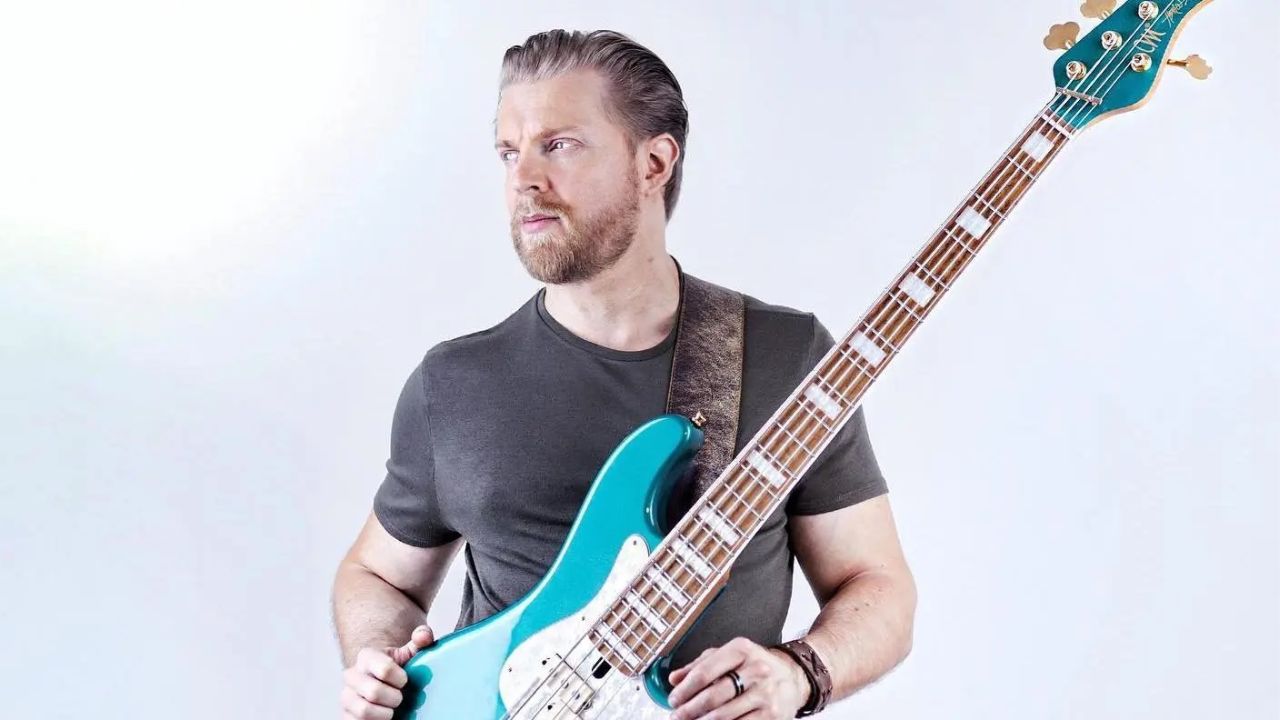K.Flay on her prized gear, music as liberation and how Tom Morello ended up on new EP, Inside Voices
The rap-rock singer-songwriter shares her 'less is more' philosophy as she details her six-string journey so far
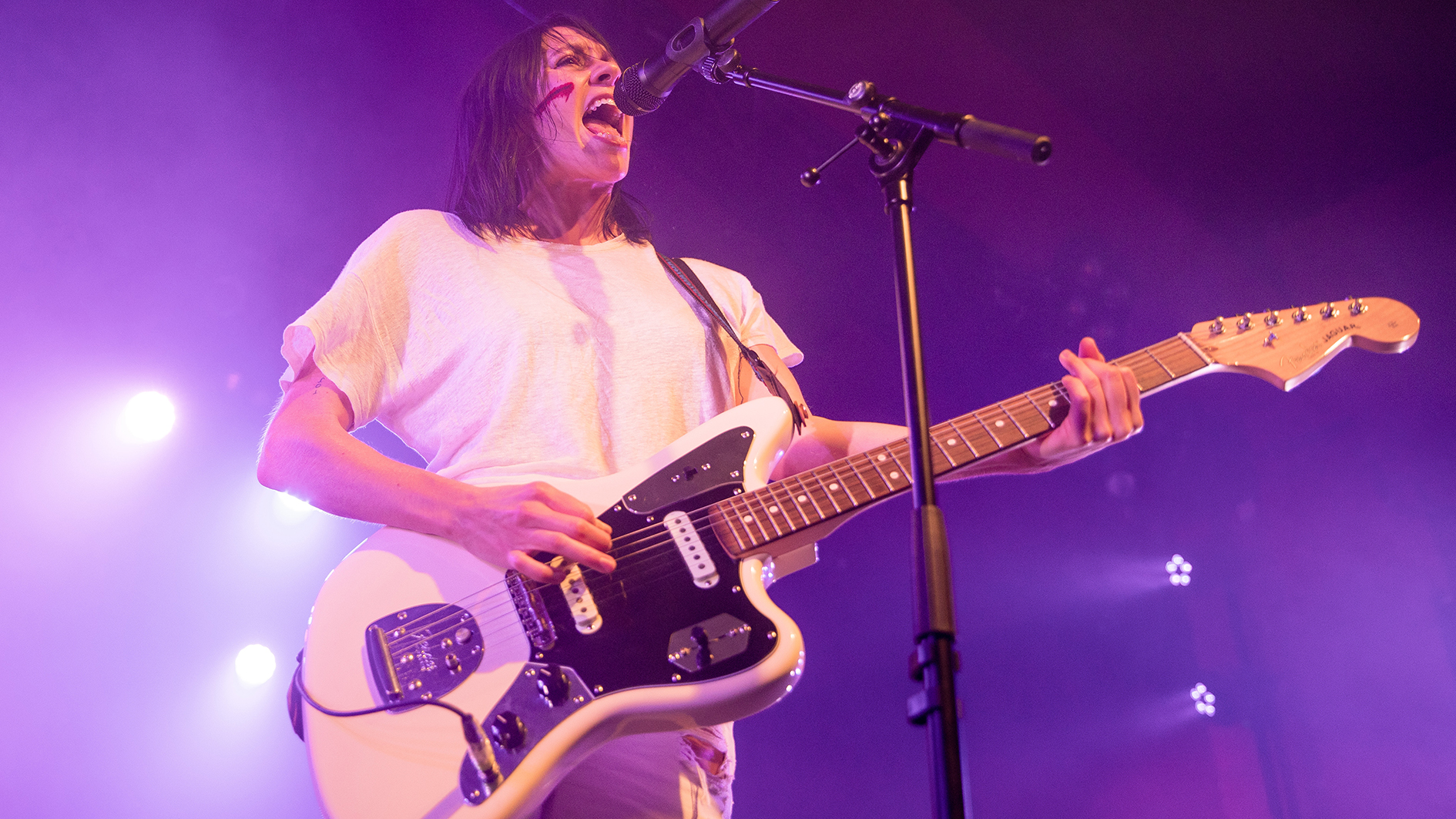
Illinois-born, Los Angeles-based songwriter and performer, K.Flay (born Kristine Meredith Flaherty) has never been afraid to show a little teeth. Whether listening to her snarling, Grammy-nominated hit, Blood in the Cut, or the boisterous tracks off her forthcoming five-track EP, Inside Voices – out June 11 via BMG – K.Flay’s music bites with a force bolstered by sharp, scathing lyrics and often riff-heavy production.
With Inside Voices, the Billboard chart-topping artist will release her second record in about a year. She released her EP, Don’t Judge A Song By Its Cover, in 2020. But her new collection is some of her best work to date.
The album includes the acerbic tracks, Four Letter Words and Good Girl, along with powerful and percolating TGIF, which boasts Rage Against The Machine guitarist, Tom Morello. Also featured on the album is Blink-182 drummer Travis Barker on the song, Dating My Dad.
We caught up with K.Flay to ask her about her entrance into music while attending Stanford University, how her late father influenced her love of guitar, the instruments and pedals she can’t live without and what it was like to work with Morello on the new EP.
When did you first find music? When did music enter your world in a significant way as a young person?
“On some level, not until I was in college. I didn’t develop a fascination or an emotional connection to music until that time. Music was played in my home and my biological dad taught me rudimentary guitar when I was around 10.
“So, it was around but never anything, again, that I was fascinated by or felt really transported me. Then I moved to the Bay Area for college when I was 18 and immediately got immersed in this world of music.
Get The Pick Newsletter
All the latest guitar news, interviews, lessons, reviews, deals and more, direct to your inbox!
“This was when there was a lot of file-sharing going on, a lot of downloading. There were all these servers within the university that were protected where people just shared music.
“And all of a sudden, I was around all these kids from California, who grew up listening to different music and, specifically, grew up listening to a lot of indie rap and underground rap that I’d never heard of. So, there was a lot of new music swirling in my world.”
What about music and the environment you were in at college made you dive so deeply into the art form?
“It’s a good question. I’m often boggled by the fact that my life has unfolded in this manner. It think there’s two answers to it. The first is that I was a very regimented teenager and young person.
“I had a lot of black-and-white ideas about how I was meant to live in this world. I think a lot of teenagers go through that. And I think adulthood is the widening, the broadening of the grey area of life and realizing how much ambiguity is everywhere.
“But yeah I had these pretty defined ideas about how I was going to act, what I was going to do and how I needed to perform in school. I didn’t know anybody who made music.
I think there was probably a part of my psyche that was yearning for that liberation and music was that
“I didn’t know kids in bands. I wasn’t a part of any scene. So, music kind of popped up as this territory where there were no expectations for me and where I had no expectations for myself.
“I think there was probably a part of my psyche that was yearning for that liberation and music was that. I did it as a hobby in college but I was serious about it in the sense that I really loved it. It felt like uncharted territory for me and I think that was what was so important.
“It wasn’t a world where I had expectations even about how to do it. I wasn’t even like well this band did it like this so I should do it like that. I was just, like, whatever!
“The second part of it was a broadening opening up of my consciousness and world in which I started saying yes to lots of things. For quite sometime, I was totally sober in my life and music was also this way to be at a frat party because I would perform.
“I’d perform at a house party. So, I was able to participate in the nightlife world without having to compromise what I wanted to in terms of substances.”
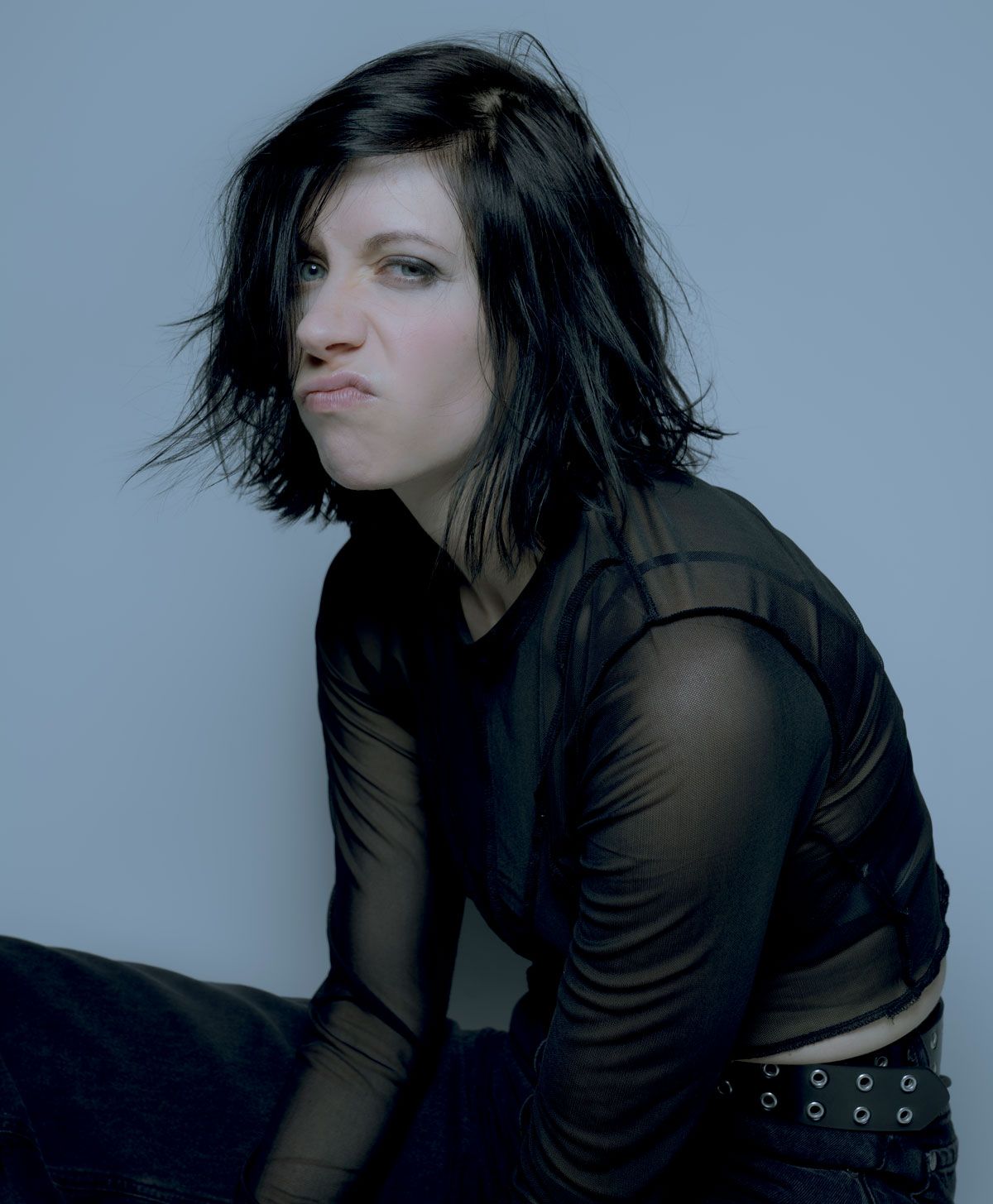
Or, not do, it sounds like?
“Right! Correct. Not do.”
You said your biological father taught you guitar and I know he died when you were young. Given your relationship to music today, does his memory still influence your work?
“My biological dad has been sort of this ghost-like presence in my life. I was 14 when he died. So, I was a little bit younger. But I think when you have a parent pass away during adolescence, specially, because you’ve gotten to know them a little bit, but not really, there is this kind of yearning to keep writing the story a little bit.
“Music kind of offered that. I think my dad was a very troubled person in many ways. But my mom and my other dad, who raised me and adopted me, always really wanted him to figure prominently in my life, too.
“They didn’t want to erase that memory. I think, for me and for my family, it was this nice way of keeping his legacy alive. My mom frequently will say to me, “Your dad would just be so stoked this was happening!”
“He really liked music and probably, taking his drinking and drug habits into account, would have fit in really well in the world of touring musicians. But, yeah, I think there was – again, not a super-conscious, but when I reflect back, definitely there is an ode to him and his influence on me and to unfinished business, in a way.”
There’s this story that you started listening to music on the radio and said something like, “I can easily do better than that!” Is that the truth? Is that vibe you were feeling?
“Yeah, that was the vibe. I think that was around 2004, I believe, when that started going down. The process of making music at that time was a process of amazement. I was amazed at my ability – and I don’t mean 'me', specifically. I mean 'me' like everybody. The ability of a human being to take nothing and use these programs and random shit I had in my dorm room to make something cool.
There's a sense of freedom that you invariably have when you begin something totally new and there are no rules and you don’t have a track record and no one gives a shit
“I remember when I picked up the first CD I had pressed. I couldn't believe it. I was incredulous that it was possible to take the work of your liberated creative mind and turn it into something tangible.
“I will say to you that I don’t know if I’ve ever really lost that sensation. If I ever do, that’s when I should hang it up and do something else. It’s a very small miracle that I find continually very exciting and joyful.”
It’s so interesting because this thing that you found so much success in and love for was at first something you almost avoided. Do you think about that?
“I have thought about that. I think a lot of it has to do with – and I keep talking about it – this liberation. I think we are most successful when we feel free. We often don’t even consider areas that might offer us great freedom because it’s not even in our orbit yet. That’s the paradox.
“The thing that might offer the greatest freedom are, as yet, unknown. It’s crazy when you think about life in that manner.
“Much of quarantine I’ve spent re-engaging with this sense of freedom that you invariably have when you begin something totally new and there are no rules and you don’t have a track record and no one gives a shit.
“When it’s just the pure form of creativity. I think there are so many examples of that, anecdotally, where the thing is actually the last thing they imagined. I think for a lot of people who knew me growing up, they’re like, 'Wait, what? This is what she did?' So, there is an element of that.”
You were nominated for a Grammy for your hit Blood in the Cut, and for the engineering of the LP that song was on, Every Where Is Some Where. How did that success impact you – is it ever a burden for you now, especially given your new phase of creativity?
“I think very clearly, like, that song and the album that song is on, in my mind, that was just a great experience of more possibility for me. As an artist, there’s lots of things you’re looking for in your career but one of them is just access.
“There are so many closed doors. I think when you have a song that connects in a way, it gives you better access to opportunities and to playing bigger venues and getting heard on the radio.
“So, I think Blood in the Cut and the subsequent music just really felt like, okay, at least I’m getting this bigger shot and I feel excited by that. Especially because that song did well on the radio and that was a totally new experience for me.
“I had never – I didn’t know what that was like. I didn’t know the world of terrestrial radio. And it introduced me to this other part of the music business. The radio made a big impact on my career.”
Okay, let’s talk guitars! What is your relationship to the instrument today? How does the guitar or guitar music influence your songwriting? Is there one you carry with you everywhere?
“For a long time and still, the guitar is often the starting point in my songwriting process. I joke with my manager about how fucking powerful the low-E string is. Whether it’s a riff or a progression, I tend to gravitate in the early stages of the writing process to things that are basic, in a way.
My number-one guitar, which I inherited from my biological dad, is a 1950s short-neck Silvertone from a Sears catalogue
“I don’t say that to denigrate them but I’m not, like – all of the layers and nuance come much later. So, that’s where I start, noodling around, essentially.
“While there are certainly times when I wish I had technical training, I’ve actually come to view it as quite a blessing that I don’t. Because, again, speaking about this concept of freedom, and I can remember talking to my guitarist on tour about this, who went to music school.
“Because I was complaining like, 'I wish I knew more music theory.' But he was like, 'I wish I knew less!' So, I think there’s probably some sweet spot. But I think one of the things I really like about guitar is that while I have improved my technical ability quite a bit, I still approach the instrument in many ways as a beginner. Or, at least, I have a beginner’s mind when it comes to songwriting.
“In terms of guitars that mean a lot to me, the number-one guitar, which I inherited from my biological dad, and I don’t know the exact year, is a 1950s short-neck Silvertone from a Sears catalogue.
“He got that when he was a child and he kept it. That’s what I learned to play on and I have it still. I obviously don’t take that on tour, or anything like that. But that’s a guitar that I very frequently write on. It’s literally the easiest guitar in the world to play. It’s awesome. No action at all. And it sounds great!
“So, that’s certainly my most prized guitar for a number of reasons. But the guitar that I play on tour and have been recording with is a Jaguar that I like a lot. That’s been my go-to for the last few years, at least. It’s cream, I guess you’d call it.
“Then, you mentioned the Grammy nominations, Fender had this sparkly gold Jazzmaster – because I play Fenders only, essentially. They had sent that over as a “Congrats”. But I had it set up two years ago and it sounds fuckin' great. I play it very frequently now, as well. So, those are the three main ones for me.”
Are there any pieces of guitar gear or pedals that you can’t live without?
“Oh, yeah, 100 percent! They have not paid me to say this, but I’m just obsessed with the Hoof Reaper dual pedal from EarthQuaker – it’s, like, my number-one I can’t live without. I’ve used that pedal on the last three records, so the last six years of my life. I love that.
“For a while I was just using a Hoof separately but then they made the combo pedal. I’m looking at it right now. I’m also looking at my Fender Deluxe Reverb, which is the go-to amp that we bring on tour and I rehearse on. So, those are the things I guess I can’t live without.
“But I’m also very much a believer in less is more, in a way. I know some people love – basically, what I’m trying to say is that I’m not a gearhead. What’s funny is that my brother is getting pretty good at guitar.
“He’s been practicing a lot during quarantine. He just bought this really nice Telecaster and he’s shredding, he’s doing great. But he’s asking me all these gear questions and I’m like, 'Andy, I don’t even know!'
“I’m very much like, 'Whatever’s there is there!' I think having the ability to have grit and volume are the two most important things to me, along with a little bit of atmosphere. But for the most part as far as my purposes go, I like to have a set of, like, eight things total that I use and we can call it a day!”
I understand the need for categorization in the world because there’s so much content that we have to organize it. But I don’t think about it much
People often cite your music as rap but it also incorporates other genres and sounds. When you think about the balance of influences in your work and what it is at its core, what comes to mind?
“I understand the need for categorization in the world because there’s so much content that we have to organize it. But I don’t think about it much. I only think about it, to be honest with you, when I get asked about it or in conversations about, like, radio format.
“There are certain places in which genre is more salient, though, I think it’s perhaps been breaking down. Over the past five years in particular, I sort of feel like people don’t care. There is so much more mixing and those boundaries and delineations feel diluted in good way.
“I think more than anything, the commonality or the through line of what I do is that I make, I think, I don’t want to say hype up music but there is some element of that. A lot of my music is the music people exercise to. There’s some spirit of movement and energy.
“To me, that is more the genre. People don’t really listen to my music to chill out and I’m sure there’s some people who do. But it’s more like you want to get hyped up.
“I know that’s not a genre but I think the mood of it is somewhat consistent. So, when I’m writing songs, I’m like, hey am I living in this spirit that I like and feel like I know.
“Am I tapped into that? I’m a very high-energy person, so it makes sense to me that I make music like that. Then, of course, I listen to music and I’m like, 'Why can’t I make music like this that’s chill and beautiful?' But then I’m like, 'Well, I don’t. I make something else!'”
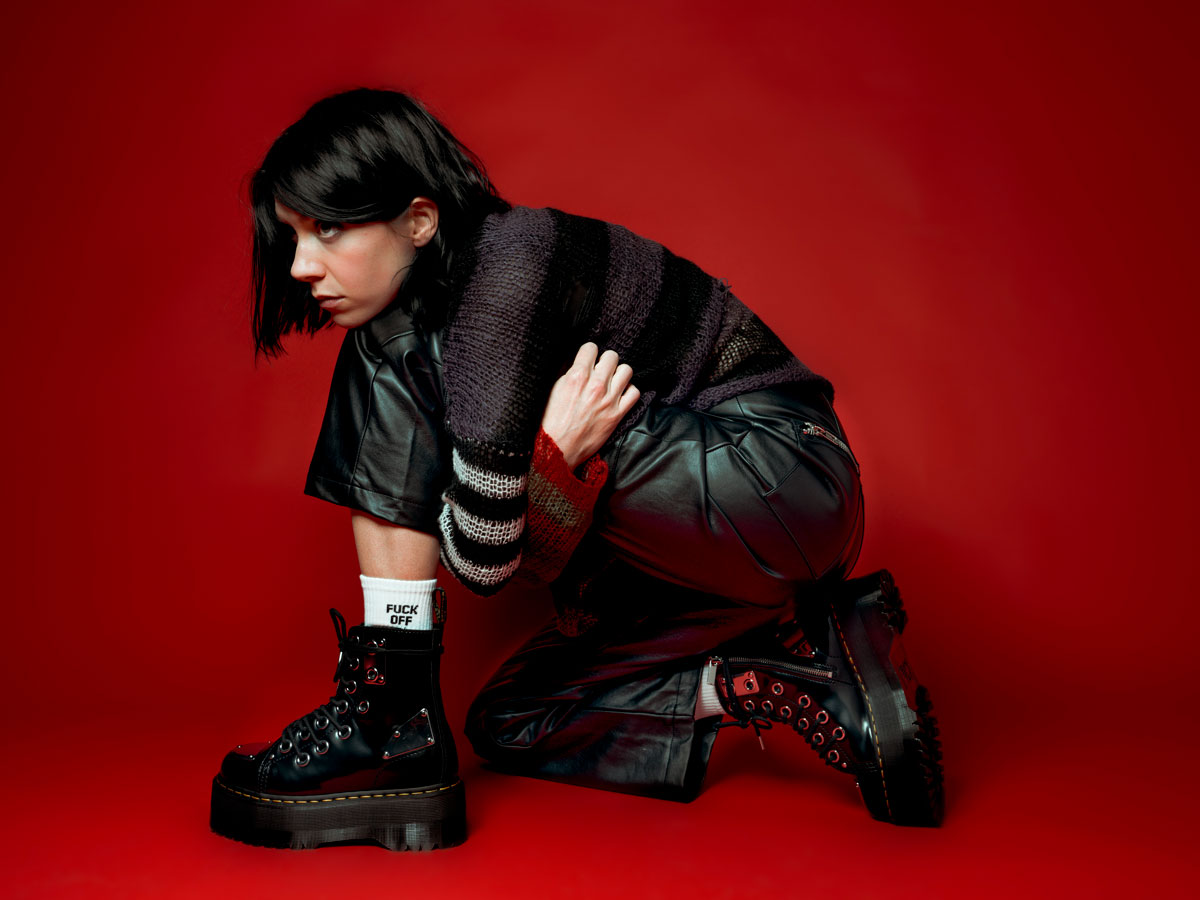
You collaborated with the great Tom Morello for the new EP on the song, TGIF. What was that collaboration like and how did it feel when you heard his amazing, bubbly solo on the track?
“That track began with me alone in the studio. The main riff of the song, I wrote and did on my Jazzmaster. I thought it was really cool and I started writing this meandering song.
“I started writing that first verse when Donald Trump was still president. The world is still run by lunatics, which is the first line of the song. So, that hasn’t really changed. But that feeling and that sense was very present in my mind at the moment.
“So, I started working on it then. It was just this little rough idea how many of my demos are. Me on guitar and I sing a verse and a chorus and then I ask myself, 'Is there anything here?'
“I started then working on it with two producers, who are my frequent collaborators, though they’ve never worked on a song of mine together. A guy named Tommy English and a guy named JT Daly.
Tom Morello is unpredictable and endlessly fascinating as a guitar player, in my opinion
“We started working on it and I think at some point – I’ve been friends with Tom now for about four years. We met – he actually cold emailed me four years ago, which was a really nice email to receive. We have a lot of commonalities. We’re from the same suburbs of Chicago, we both went to elite colleges and ended up in music and I had featured on Tom’s record.
“So, Tommy English, the producer, who is also from the Chicago suburbs, I think he brought up the idea to ask Tom to play on this and to possibly contribute a solo in a big way. The spirit of the song is, I suppose, a primal scream in the face of capitalism, which, of course, I am a part of a feel like I can’t escape. So, it felt like it was up Tom’s ally thematically.
“I sent it to him and I think he recorded it the next week. I think the only thing I said was, 'Do your thing, as unhinged and as experimental you feel like getting.' And I think the second half of his solo is one of my favorite things Tom has done.
“Of course what so many people love about Tom, what I love about Tom, is how liberated and original he is. He is unpredictable and endlessly fascinating as a guitar player, in my opinion. So, it was so cool to experience that.
“I remember we got the files back and were like, 'Oh my god!' I was afraid to listen but also mainly excited. Then we heard it and I was so stoked. That was really how it came together. It felt like this really cool collaboration. JT is from Ohio so there’s this Midwestern energy to it, which also means something to me.”
Your style is often rich with attitude in your songs, almost even depraved at times. Given that music can offer this space for you, what do you love most about it?
“For a long time, people would ask me, 'What’s the difference between K.Flay and Kristine?' And I would be like, 'There is no difference! I’m me!' Then somewhat recently I realized there is a difference, there is a very large difference.
“And I think the difference touches on this question, which is K.Flay, as a musical project and as an outlet for me, is the place where I get to be unhinged and impolite.
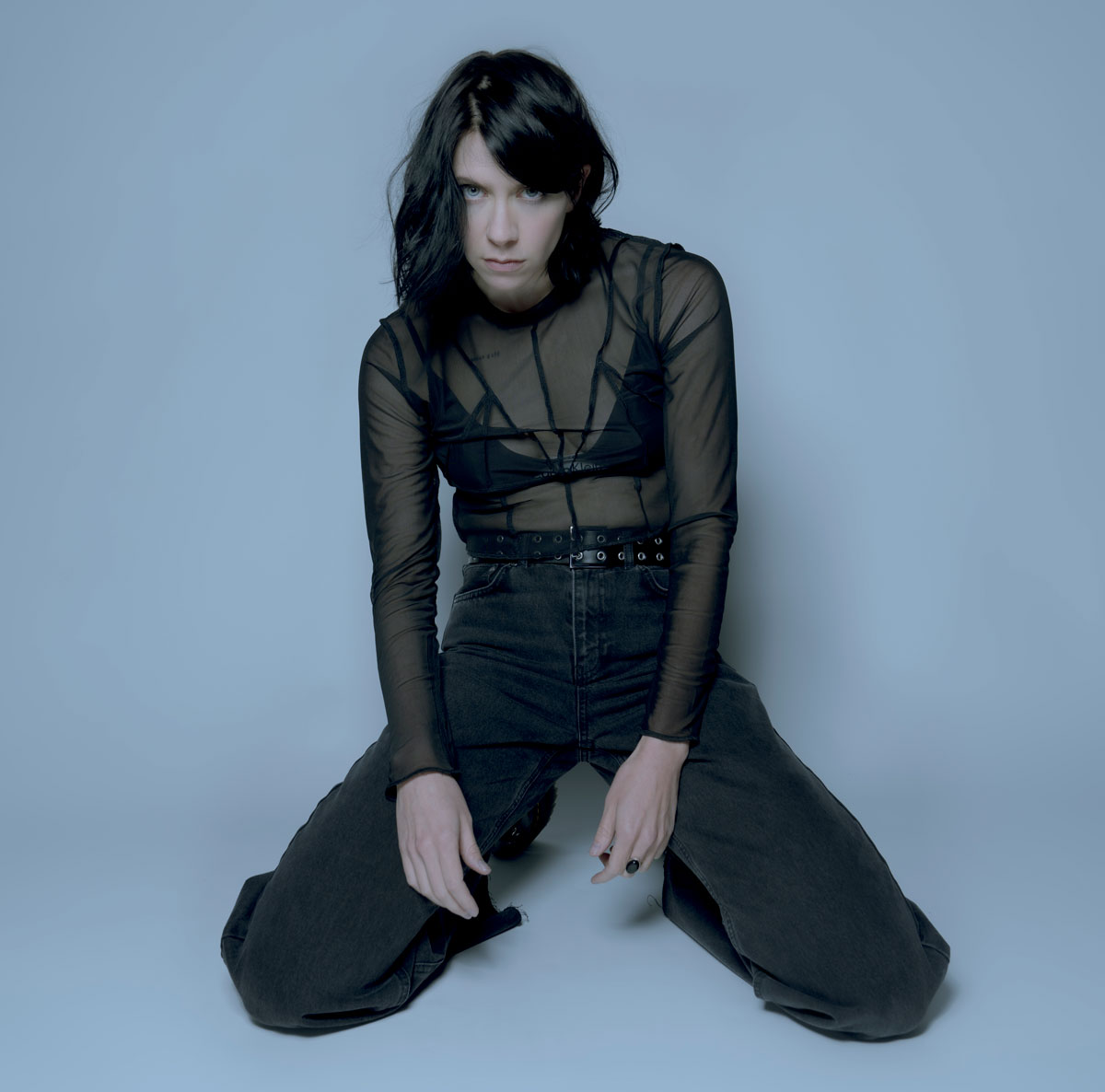
“I think for a lot of people – music has a giant role in human history in a variety of ways – but I think one of the crucial ways that it does is both personal and group catharsis.
“There’s nothing like that feeling, whether it’s a loud release of energy, whether it’s a quite reckoning. I think it can manifest in many ways. But it really is that avenue of catharsis. I think for me, not to say I’m super-repressed, but we’re all repressed in different ways.
“And I think music has allowed me to enact and channel darker instincts and particularly with this new EP, which, conceptually, its like the utterances of my ID, in a way, some of which are petulant and childish in a way. Just telling someone, 'Hey fuck you!' is not the most complex or nuanced thing to say.
“But it certainly is a primal thing to say. I think having primal and fundamentally safe releases for our shame and our frustration is really important. I think music is one of those places. That’s what it is for me as both an artist and a listener.”
“I said, ‘Merle, do you remember this?’ and I played him his song Sweet Bunch of Daisies. He said, ‘I remember it. I've never heard it played that good’”: When Roy Clark met his guitar hero
“I asked Marcus to sing on it. As amazing as he is on bass, I think he’s underrated as a vocalist”: Having earned lofty status in bass-hero circles, Marcus Miller lent his vocal chops to Hadrien Feraud’s solo album
